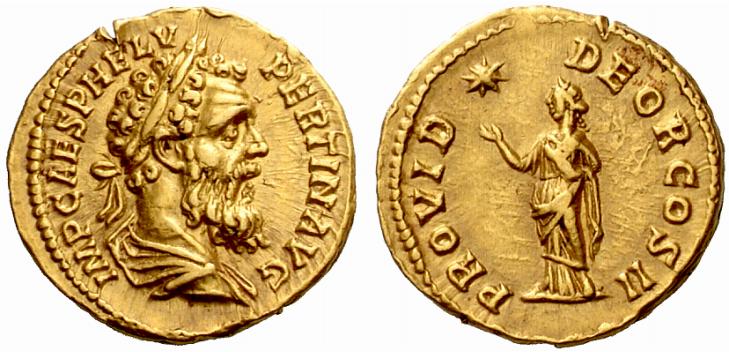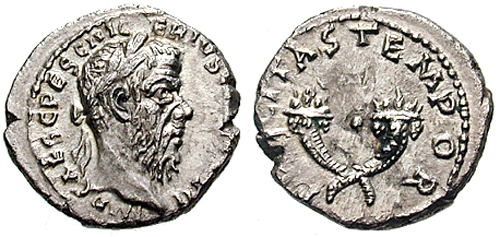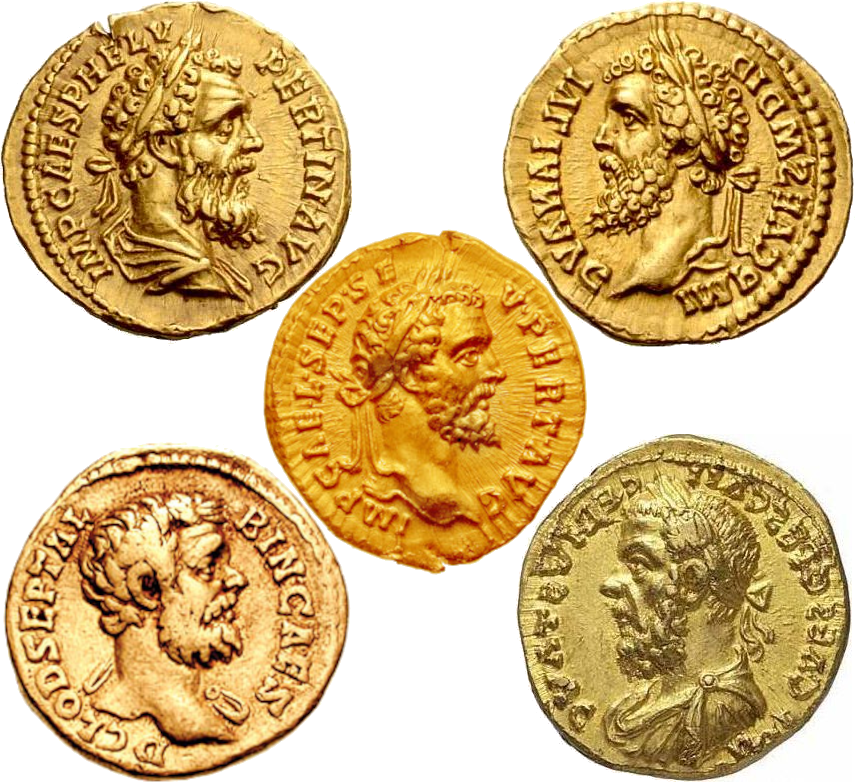|
193
Year 193 ( CXCIII) was a common year starting on Monday (link will display the full calendar) of the Julian calendar. At the time, it was known as the Year of the Consulship of Sosius and Ericius (or, less frequently, year 946 ''Ab urbe condita''). The denomination 193 for this year has been used since the early medieval period, when the Anno Domini calendar era became the prevalent method in Europe for naming years. Events By place Roman Empire * January 1 – Year of the Five Emperors: The Roman Senate chooses Publius Helvius Pertinax, against his will, to succeed the late Commodus as Emperor. Pertinax is forced to reorganize the handling of finances, which were wrecked under Commodus, to reestablish discipline in the Roman army, and to suspend the food programs established by Trajan, provoking the ire of the Praetorian Guard. * March 28 – Pertinax is assassinated by members of the Praetorian Guard, who storm the imperial palace. The Empire is auctioned o ... [...More Info...] [...Related Items...] OR: [Wikipedia] [Google] [Baidu] |
January 1
January 1 or 1 January is the first day of the year in the Gregorian Calendar. There are 364 days remaining until the end of the year (365 in leap years). This day is also known as New Year's Day since the day marks the beginning of the year. __TOC__ Events Pre-1600 *153 BC – For the first time, Roman consuls begin their year in office on January 1. *45 BC – The Julian calendar takes effect as the civil calendar of the Roman Empire, establishing January 1 as the new date of the new year. *42 BC – The Roman Senate posthumously Apotheosis, deifies Julius Caesar. * 193 – The Senate chooses Pertinax against his will to succeed Commodus as Roman emperor. *AD 404, 404 – Saint Telemachus tries to stop a gladiatorial fight in a Roman amphitheatre, and is Stoning, stoned to death by the crowd. This act impresses the Christian Emperor Honorius (emperor), Honorius, who issues a historic ban on gladiatorial fights. * 417 – Emperor Honorius forces Galla ... [...More Info...] [...Related Items...] OR: [Wikipedia] [Google] [Baidu] |
April 14
Events Pre-1600 *43 BC – Legions loyal to the Roman Senate, commanded by Gaius Pansa, defeat the forces of Mark Antony in the Battle of Forum Gallorum. * 69 – Vitellius, commanding Rhine-based armies, defeats Roman emperor Otho in the First Battle of Bedriacum to take power over Rome. * 966 – Following his marriage to the Christian Doubravka of Bohemia, the pagan ruler of the Polans, Mieszko I, converts to Christianity, an event considered to be the founding of the Polish state. * 972 – Otto II, Co- Emperor of the Holy Roman Empire, marries Byzantine princess Theophanu. She is crowned empress by Pope John XIII in Rome the same day. *1395 – Tokhtamysh–Timur war: At the Battle of the Terek River, Timur defeats the army of the Golden Horde, beginning the khanate's permanent military decline. *1471 – In England, the Yorkists under Edward IV defeat the Lancastrians under the Earl of Warwick at the Battle of Barnet; the ... [...More Info...] [...Related Items...] OR: [Wikipedia] [Google] [Baidu] |
June 1
Events Pre-1600 *1215 – Zhongdu (now Beijing), then under the control of the Jurchen ruler Emperor Xuanzong of Jin, is captured by the Mongols under Genghis Khan, ending the Battle of Zhongdu. *1252 – Alfonso X is proclaimed king of Castile and León. *1298 – Residents of Riga and Grand Duchy of Lithuania defeated the Livonian Order in the Battle of Turaida. *1495 – A monk, John Cor, records the first known batch of Scotch whisky. *1533 – Anne Boleyn is crowned Queen of England. *1535 – Combined forces loyal to Charles V attack and expel the Ottomans from Tunis during the Conquest of Tunis. 1601–1900 *1648 – The Roundheads defeat the Cavaliers at the Battle of Maidstone in the Second English Civil War. *1649 – Start of the Sumuroy Revolt: Filipinos in Northern Samar led by Agustin Sumuroy revolt against Spanish colonial authorities. *1670 – In Dover, England, Charles II of England and Louis XIV of France sign the Secr ... [...More Info...] [...Related Items...] OR: [Wikipedia] [Google] [Baidu] |
March 28
Events Pre-1600 * AD 37 – Roman emperor Caligula accepts the titles of the Principate, bestowed on him by the Senate. * 193 – After assassinating the Roman Emperor Pertinax, his Praetorian Guards auction off the throne to Didius Julianus. * 364 – Roman Emperor Valentinian I appoints his brother Flavius Valens co-emperor. *1566 – The foundation stone of Valletta, Malta's capital city, is laid by Jean Parisot de Valette, Grand Master of the Sovereign Military Order of Malta. 1601–1900 * 1776 – Juan Bautista de Anza finds the site for the Presidio of San Francisco. *1795 – Partitions of Poland: The Duchy of Courland and Semigallia, a northern fief of the Polish–Lithuanian Commonwealth, ceases to exist and becomes part of Imperial Russia. *1801 – Treaty of Florence is signed, ending the war between the French Republic and the Kingdom of Naples. *1802 – Heinrich Wilhelm Matthäus Olbers discovers 2 Pallas, the s ... [...More Info...] [...Related Items...] OR: [Wikipedia] [Google] [Baidu] |
Septimius Severus
Lucius Septimius Severus (; 11 April 145 – 4 February 211) was Roman emperor from 193 to 211. He was born in Leptis Magna (present-day Al-Khums, Libya) in the Roman province of Africa. As a young man he advanced through the customary succession of offices under the reigns of Marcus Aurelius and Commodus. Severus seized power after the death of the emperor Pertinax in 193 during the Year of the Five Emperors. After deposing and killing the incumbent emperor Didius Julianus, Severus fought his rival claimants, the Roman generals Pescennius Niger and Clodius Albinus. Niger was defeated in 194 at the Battle of Issus in Cilicia. Later that year Severus waged a short punitive campaign beyond the eastern frontier, annexing the Kingdom of Osroene as a new province. Severus defeated Albinus three years later at the Battle of Lugdunum in Gaul. Following the consolidation of his rule over the western provinces, Severus waged another brief, more successful war in the east again ... [...More Info...] [...Related Items...] OR: [Wikipedia] [Google] [Baidu] |
Severan Dynasty
The Severan dynasty was a Roman imperial dynasty that ruled the Roman Empire between 193 and 235, during the Roman imperial period. The dynasty was founded by the emperor Septimius Severus (), who rose to power after the Year of the Five Emperors as the victor of the civil war of 193–197, and his wife, Julia Domna. After the short reigns and assassinations of their two sons, Caracalla () and Geta (), who succeeded their father in the government of the empire, Julia Domna's relatives themselves assumed power by raising Elagabalus () and then Severus Alexander () to the imperial office. The dynasty's control over the empire was interrupted by the joint reigns of Macrinus () and his son Diadumenian (). The dynasty's women, including Julia Domna, the mother of Caracalla and Geta, and her nieces Julia Soaemias and Julia Mamaea, the mothers respectively of Elagabalus and Severus Alexander, and their own mother, Julia Maesa, were all powerful '' augustae'' and instrumental in sec ... [...More Info...] [...Related Items...] OR: [Wikipedia] [Google] [Baidu] |
Didius Julianus
Marcus Didius Julianus (; 29 January 133 or 137 – 2 June 193) was Roman emperor for nine weeks from March to June 193, during the Year of the Five Emperors. Julianus had a promising political career, governing several provinces, including Dalmatia and Germania Inferior, and defeated the Chauci and Chatti, two invading Germanic tribes. He was even appointed to the consulship in 175 along with Pertinax as a reward, before being demoted by Commodus. After this demotion, his early, promising political career languished. Julianus ascended the throne after buying it from the Praetorian Guard, who had assassinated his predecessor Pertinax. A civil war ensued in which three rival generals laid claim to the imperial throne. Septimius Severus, commander of the legions in Pannonia and the nearest of the generals to Rome, marched on the capital, gathering support along the way and routing cohorts of the Praetorian Guard Julianus sent to meet him. Abandoned by the Senate and the Pr ... [...More Info...] [...Related Items...] OR: [Wikipedia] [Google] [Baidu] |
Pertinax
Publius Helvius Pertinax (; 1 August 126 – 28 March 193) was Roman emperor for the first three months of 193. He succeeded Commodus to become the first emperor during the tumultuous Year of the Five Emperors. Born the son of a freed slave, Pertinax became an officer in the army. He fought in the Roman–Parthian War of 161–166, where his success led him to be promoted to higher positions in both the military and political spheres. He achieved the rank of provincial governor and urban prefect. He was a member of the Roman Senate, serving at the same time as the historian Cassius Dio. Following the death of Commodus, Pertinax was proclaimed emperor. He attempted to institute several reform measures, although the short duration of his reign as emperor prevented the success of those attempts. One of those reforms, the restoration of discipline among the Praetorian Guard, led to conflict that eventually culminated in Pertinax's assassination by the Guard. Pertinax would ... [...More Info...] [...Related Items...] OR: [Wikipedia] [Google] [Baidu] |
Syria
Syria ( ar, سُورِيَا or سُورِيَة, translit=Sūriyā), officially the Syrian Arab Republic ( ar, الجمهورية العربية السورية, al-Jumhūrīyah al-ʻArabīyah as-Sūrīyah), is a Western Asian country located in the Eastern Mediterranean and the Levant. It is a unitary republic that consists of 14 governorates (subdivisions), and is bordered by the Mediterranean Sea to the west, Turkey to the north, Iraq to the east and southeast, Jordan to the south, and Israel and Lebanon to the southwest. Cyprus lies to the west across the Mediterranean Sea. A country of fertile plains, high mountains, and deserts, Syria is home to diverse ethnic and religious groups, including the majority Syrian Arabs, Kurds, Turkmens, Assyrians, Armenians, Circassians, Albanians, and Greeks. Religious groups include Muslims, Christians, Alawites, Druze, and Yazidis. The capital and largest city of Syria is Damascus. Arabs are the largest ethnic group, ... [...More Info...] [...Related Items...] OR: [Wikipedia] [Google] [Baidu] |
Pescennius Niger
Gaius Pescennius Niger (c. 135 – 194) was Roman Emperor from 193 to 194 during the Year of the Five Emperors. He claimed the imperial throne in response to the murder of Pertinax and the elevation of Didius Julianus, but was defeated by a rival claimant, Septimius Severus, and killed while attempting to flee from Antioch. Early career Although Niger was born into an old Italian equestrian family, around the year 135, he was the first member of his family to achieve the rank of Roman senator.Potter, p. 101 Not much is known of his early career; it is possible that he held an administrative position in Egypt, and that he served in a military campaign in Dacia early in Commodus’ reign.Meckler, ''Pescennius Niger'' During the late 180s, Niger was elected as a Suffect consul, after which Commodus made him imperial legate of Syria in 191. He was still serving in Syria when news came of the murder of Pertinax, followed by the auctioning off of the imperial title to Didius ... [...More Info...] [...Related Items...] OR: [Wikipedia] [Google] [Baidu] |
Roman Empire
The Roman Empire ( la, Imperium Romanum ; grc-gre, Βασιλεία τῶν Ῥωμαίων, Basileía tôn Rhōmaíōn) was the post- Republican period of ancient Rome. As a polity, it included large territorial holdings around the Mediterranean Sea in Europe, North Africa, and Western Asia, and was ruled by emperors. From the accession of Caesar Augustus as the first Roman emperor to the military anarchy of the 3rd century, it was a Principate with Italia as the metropole of its provinces and the city of Rome as its sole capital. The Empire was later ruled by multiple emperors who shared control over the Western Roman Empire and the Eastern Roman Empire. The city of Rome remained the nominal capital of both parts until AD 476 when the imperial insignia were sent to Constantinople following the capture of the Western capital of Ravenna by the Germanic barbarians. The adoption of Christianity as the state church of the Roman Empire in AD 380 and the fall of th ... [...More Info...] [...Related Items...] OR: [Wikipedia] [Google] [Baidu] |
Year Of The Five Emperors
The Year of the Five Emperors was AD 193, in which five men claimed the title of Roman emperor: Pertinax, Didius Julianus, Pescennius Niger, Clodius Albinus, and Septimius Severus. This year started a period of civil war when multiple rulers vied for the chance to become emperor. The political unrest began with the murder of Emperor Commodus on New Year's Eve 192. Once Commodus was assassinated, Pertinax was named emperor, but immediately aroused opposition in the Praetorian Guard when he attempted to initiate reforms. They then plotted his assassination, and Pertinax was killed while trying to reason with the mutineers. He had only been emperor for three months. Didius Julianus, who purchased the title from the Praetorian Guard, succeeded Pertinax, but was ousted by Septimius Severus and executed on June 1. Severus was declared Caesar by the Senate, but Pescennius Niger was hostile when he declared himself emperor. This started the civil war between Niger and Severus; both gat ... [...More Info...] [...Related Items...] OR: [Wikipedia] [Google] [Baidu] |



.jpg)



